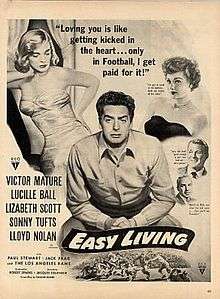Easy Living (1949 film)
| Easy Living | |
|---|---|
 Theatrical release poster | |
| Directed by | Jacques Tourneur |
| Produced by | Robert Sparks |
| Written by |
Irwin Shaw Charles Schnee |
| Starring |
Victor Mature Lucille Ball Lizabeth Scott |
| Music by | Roy Webb |
| Cinematography | Harry J. Wild |
| Edited by | Frederic Knudtson |
| Distributed by | RKO Radio Pictures |
Release dates |
|
Running time | 77 minutes |
| Country | United States |
| Language | English |
Easy Living is a 1949 American drama film directed by Jacques Tourneur, starring Victor Mature, Lizabeth Scott and Lucille Ball.[1] The film features the real-life Los Angeles Rams football team.
Plot
Star professional quarterback Pete Wilson (Victor Mature) thinks nothing of his future after football, not even after longtime teammate Bill "Holly" Holloran (Gordon Jones) is released by the team. Pete gets advance after advance on his salary from Anne (Lucille Ball), the secretary of team owner and coach Lenahan (Lloyd Nolan).
One day, however, he goes secretly to see a doctor (Jim Backus) about various symptoms he has been experiencing and learns that he has a heart condition due to a childhood bout of rheumatic fever, one that could kill him if he continues playing football. He starts to tell his wife Liza (Lizabeth Scott), but changes his mind when she is cool to Holly, whom she describes as a has-been after he is gone.
Liza is struggling to make her own interior design business a success, and drags Pete to a fancy party to try to land Gilbert Vollmer as a client. Gilbert knows she has no talent, but is interested in her for other reasons. So is his father, Howard (Art Baker). The older man is looking to replace his young girlfriend, Billy Duane, and dangles before Liza the prospect of redecorating his apartment. Knowing what he is after, Liza is willing to do whatever it takes to further her ambitions.
Meanwhile, Pete is bitterly disappointed when his friend, retiring college head coach Virgil Ryan (Everett Glass), informs him that he cannot recommend him as his replacement because Liza is unsuitable for the duties of a coach's wife. Instead, the job is given to Pete's teammate and friend, Tim "Pappy" McCarr (Sonny Tufts). Tim offers Pete the position of his assistant, but Pete turns it down.
Afraid of physical contact, Pete turns in a very poor performance and loses the next game. Lenahan cannot afford another loss if he wants to make the playoffs (and earn $100,000), so he benches Pete in favor of Tim. Tim plays well, and they win their next game.
When Pete proposes taking the assistant coaching position, Liza breaks up with him. However, when she gets dumped by Howard, she tries unsuccessfully to get Pete back. Pete is given another chance at glory when Tim is injured, but ultimately tells his teammates about his condition and walks away from the game. Though Anne has made it clear that she loves him, Pete decides to take Liza back, making it clear, however, that it will be on his terms.
Cast
- Victor Mature as Pete Wilson
- Lucille Ball as Anne, Lenahan's secretary
- Lizabeth Scott as Liza Wilson
- Sonny Tufts as Tim "Pappy" McCarr
- Lloyd Nolan as Lenahan
- Paul Stewart as Dave Argus, a reporter
- Jack Paar as Scoop Spooner
- Jeff Donnell as Penny McCarr
- Art Baker as Howard Vollmer
- Gordon Jones as Bill "Holly" Holloran
- Don Beddoe as Jaeger
- Richard Erdman as Buddy Morgan (as Dick Erdman)
- William "Bill" Phillips as Ozzie, the trainer
- Charles Lang as Whitey
- Kenny Washington as Benny
- Julia Dean as Mrs. Belle Ryan, Virgil's wife
- Everett Glass as Virgil Ryan
- Jim Backus as Dr. Franklin (as James Backus)
- Robert Ellis as Urchin
- Michael St. Angel as Gilbert Vollmer (as Steven Flagg)
- Alex Sharp as Don
- Russell Thorson as Hunk "Eddie" Edwards (as Russ Thorson)
- June Bright as Billy Duane, who commits suicide when Howard Vollmer discards her
- Edward Kotal as Curly
- Audrey Young as Singer
Production
Victor Mature was under contract to 20th Century Fox but had an obligation to make a movie at RKO which dated from before the war. He was announced for Battleground and Mr Whiskers before eventually being cast in a serious drama about football, Interference, which became Easy Living.[2]
There was a great deal of turbulence at RKO at the time due to the fact that Howard Hughes had bought the studio and head of production Dore Schary had resigned. Films such as Battleground, Bed of Roses and Setup were cancelled. However Interference went ahead started 12 July 1948.[3]
Reception
The film was not released until October 1949, by which time its title had been changed to Easy Living.[4]
Box office
It recorded a loss of $625,000.[5]
References
- ↑ "New York Times: Easy Living". NY Times. Retrieved July 19, 2008.
- ↑ THOMAS F BRADY (12 June 1948). "TWO MOVIE LEADS TO VICTOR MATURE: He Will Co-Star With Lamarr in 'Samson and Delilah,' Be Seen in 'Interference'". New York Times. p. 9.
- ↑ Schallert, Edwin (30 June 1948). "Tufts in 'Interference;' Foster 'Big Cat' Star". Los Angeles Times. p. 19.
- ↑ "Of Local Origin". New York Times. 5 Aug 1949. p. 23.
- ↑ Richard B. Jewell, Slow Fade to Black: The Decline of RKO Radio Pictures, Uni of California, 2016
External links
- Easy Living at the Internet Movie Database
- Easy Living at AllMovie
- Easy Living at the TCM Movie Database
- Easy Living at the American Film Institute Catalog